In his post-game press conference following the San Jose Sharks’ loss to the Nashville Predators on March 16, head coach Peter DeBoer indicated his team was tired, saying “some of our big guys are a little fatigued.”
Here’s the thing, part of a coach’s job is to manage players so they don’t get fatigued. Is it always unavoidable? No. But can such things be mitigated by the choices the coach makes? Yes.
DeBoer’s History
The fatigue discussion is legitimate – and needs context. After the 2016-17 season ended with an opening round loss in the playoffs, DeBoer stated his team “ran out of gas” in March, a month before the playoffs started. Beginning on March 16, 2017, the Sharks lost six straight and eight of nine. Two years later, essentially to the day, DeBoer is talking about his team’s player fatigue.
The Sharks are now on a three-game losing streak.
Has DeBoer learned the importance of managing not for the regular season finish, but for the team’s overall good come the start of the playoffs? Little on this front is encouraging.
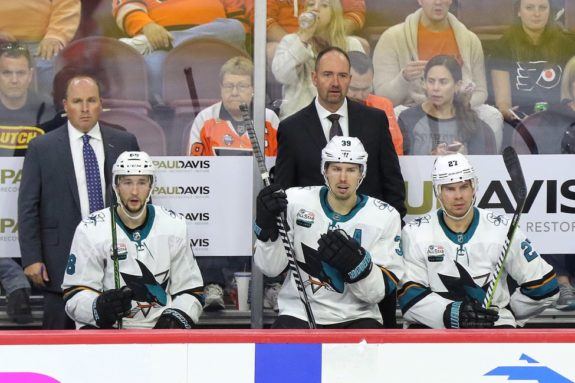
Logan Couture
Logan Couture is on track to play all 82 games for only the second time in his career. He’s also averaging one of the highest ‘per game’ ice time figures of his career. Should DeBoer pay attention? Well, yes. Couture had an elite playoff season in 2016 when he played a lot less in the regular season. He’s already played over 50 percent more minutes than he did in the 2015-16 regular season.
A few games ago I noted Couture looked exhausted. Did DeBoer do anything about it? Of course not. Couture’s not helping the team while playing on fumes. In the three-game losing streak, Couture is a shocking minus-eight.
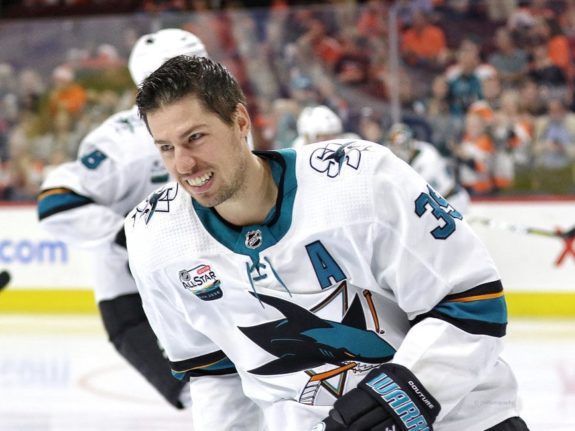
Can Couture recharge by the time the playoffs begin? And if he can can, how does it happen? It’d be nice to have a crystal ball which answers these questions, but such devices aren’t available to DeBoer. Instead, he must look at the risk-reward equation. In Couture’s case, the equation is easy. He is not helping the team now and is at risk of not being able to help later. Staying the course carries a lot more risk than reward, and it appears staying the course is DeBoer’s choice.
Brent Burns and Martin Jones
Brent Burns is another player who has been asked to step up. He’s played 110 minutes in his last four games, over 27 minutes a night. Should DeBoer care? In each of the last two seasons, Burns play fell off dramatically late in the season or in the playoffs. Have we seen Burns run out of gas before? Yes. Has DeBoer figured out he can overwork his elite defenseman in the regular season and reduce his effectiveness for the playoffs? Apparently not.
Recently, goalie Martin Jones has been garnering start after start. Jones has had an awful season. Though his play has been modestly better of late, it still hasn’t been great.
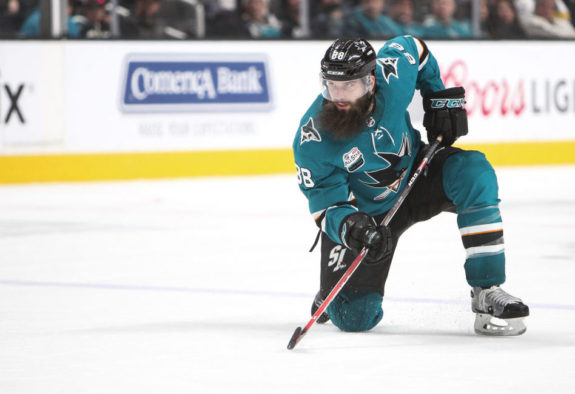
Brent Burns (Photo by Kavin Mistry/NHLI via Getty Images) 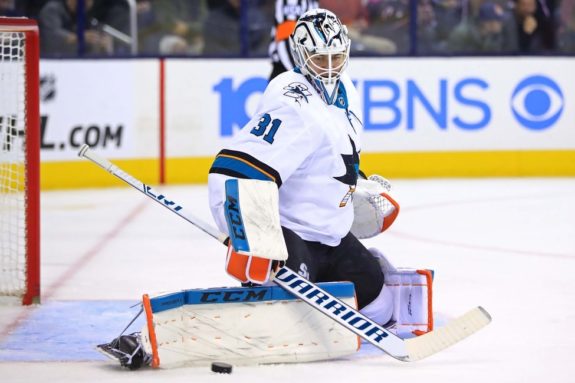
Martin Jones (Aaron Doster-USA TODAY Sports)
No Stanley Cup winning goalie has played over 58 regular season games in the last six seasons; it has happened only once in the last nine. The sweet spot appears to be somewhere around 50 games. Jones might have been able to keep his ‘games played’ under 58 and finish close to the sweet spot if DeBoer had given Jones and backup Aaron Dell a more even split following the All-Star break. Instead, DeBoer assigned Jones an enormous workload, starting 17 of 20. He’s now up to 55 games. With nine games remaining, Jones is almost certain to exceed 58 games by a good bit. While the odds say one thing, DeBoer chooses another.
DeBoer’s Lessons
In the NHL, 82 regular season games determine whether your team gets to play in the playoffs; to play a game 83 and beyond. For the Sharks, it is all about optimizing the team for game 83 and beyond.
Some will argue there is a benefit to finishing higher in the standings, that the regular season finish matters. I get the viewpoint of others who say it is critical the Sharks earn the top seed in the Pacific Division. In most seasons, I’d dismiss the argument completely, but it has more merit this season than most.
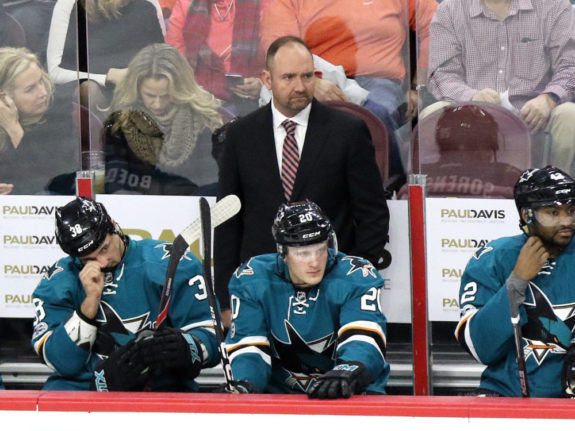
As of now, the Sharks sit second in the Pacific Division, three points behind the Calgary Flames. The teams will face each other once more, in San Jose. In other words, winning the division is possible, though the math favors Calgary.
Vegas Looms Large
The third seed in the Pacific is almost certainly going to be the Vegas Golden Knights, and they’ll face whoever finishes as the second seed. Vegas has proven a difficult matchup for the Sharks, and right now they might be the best they’ve ever been.
Twenty-two games into the season, Vegas held a 9-12-1 record. Their slow start can be attributed to the absences of several key players, notably Paul Stastny, Nate Schmidt and Alex Tuch. Vegas turned things around (not surprisingly, right after Schmidt’s return), and over the next half-season’s worth of games, went 23-14-4 (a 100-point pace over a full season). Then they made a trade deadline move and it appears to be a game-changer. They added an elite player, winger Mark Stone, and have gone 9-1-0 since. In each leg of this season, Vegas’ play has taken a major improvement. They now resemble the elite team of last season, perhaps even improved on it.
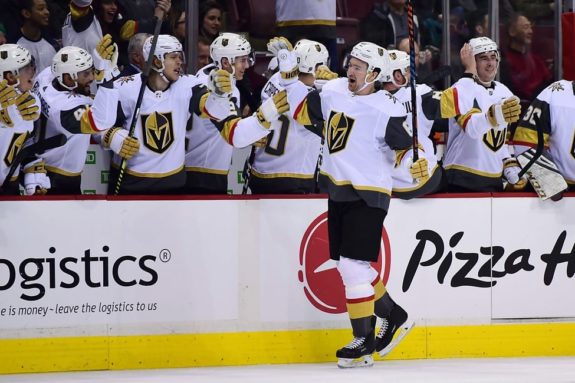
In short, a Vegas matchup in opening round of the playoffs is the perfect storm for a Sharks team looking for a Stanley Cup. Vegas is a largely healthy team finding another level as the playoffs approach. Avoiding Vegas in round one is really desirable, especially for a Sharks team which has struggled against Vegas. In 13 meetings over two seasons, the Sharks have managed regulation wins just twice.
Still, if the Sharks can’t beat Vegas in whatever round they might meet, they don’t deserve to win a Stanley Cup.
Sharks’ Real Needs
The Sharks don’t have a lengthy list of major needs, but they must be smart the rest of the way. This means giving the players who need to be fresh for the playoffs less ice time and perhaps even time off.
Jones, Burns and Couture head this list, but team captain Joe Pavelski could use a bit less work in the closing three weeks. I’d also suggest a bit less for Tomas Hertl and Timo Meier, as well. All three players deal with a lot of contact. If they have fresh legs in the playoffs, each creates challenging problems for opponents.
Conversely, players who’ll need to play bigger roles need to be given more ice time now. Two players stand out, Joakim Ryan and Gustav Nyquist. Ryan will be Burns’ partner in the playoffs and DeBoer needs to bite his lip and trust him. If not now, with a playoff spot already locked in, then when? Further, DeBoer seems to trot out Burns with Marc-Edouard Vlasic instead of Ryan from time to time, a combination with has been, well, bad this season. This helps no one.
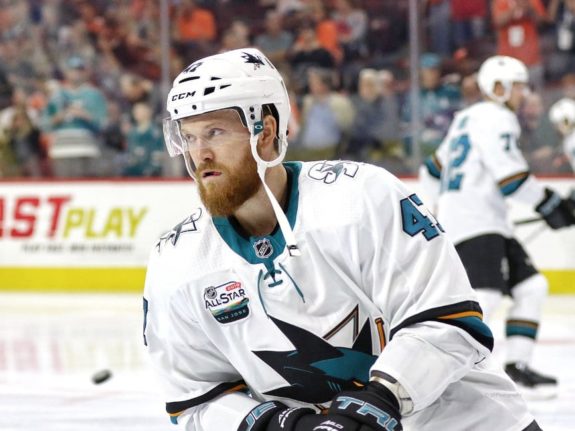
Joakim Ryan (Amy Irvin / The Hockey Writers) 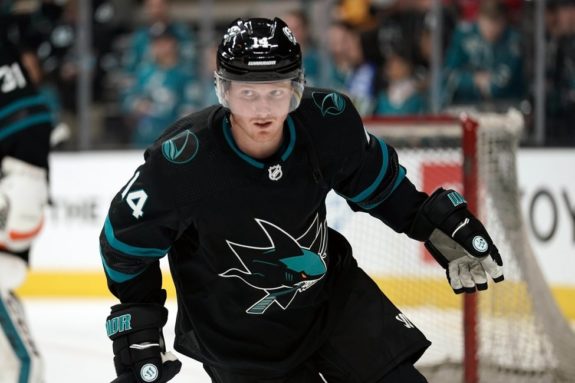
Gustav Nyquist (Stan Szeto-USA TODAY Sports)
Nyquist, like a lot of trade deadline acquisitions, hasn’t integrated smoothly. He’s capable of being much more than he’s been, and it’d be helpful if he was the Sharks’ ice time leader (among forwards) the rest of the way. The more he plays, hopefully, the better he integrates.
Lukas Radil had a nice run in the middle of the season, handling a fourth-line role and showing nice chemistry with players like Melker Karlsson and Barclay Goodrow. He’s recently been out of the Sharks lineup and Micheal Haley has stepped in. This must end and Radil should reclaim his spot. Dylan Gambrell should also see a few games along the way. In all cases, the fourth line group merits more ice time the rest of the way, perhaps 15 minutes a night; for the best of reasons, they earned it.
Defying Odds
DeBoer seems to believe he can defy odds. Even when his own experience tells a different story.
For the Sharks, the regular season is about getting into the playoffs and being the most ready they can be, independent of the opponent. DeBoer coaches as if the regular season is not a means to an end, but an end itself.
The metaphor about winning the battle but losing the war applies. The battle is in the regular season, and right now it is between the Sharks and Flames for the better seed – and avoiding Vegas in the playoffs’ opening round. But the war does not begin until the regular season is done. The Sharks need to be best prepared for the Stanley Cup Playoffs, no matter who their opening round opponent is.